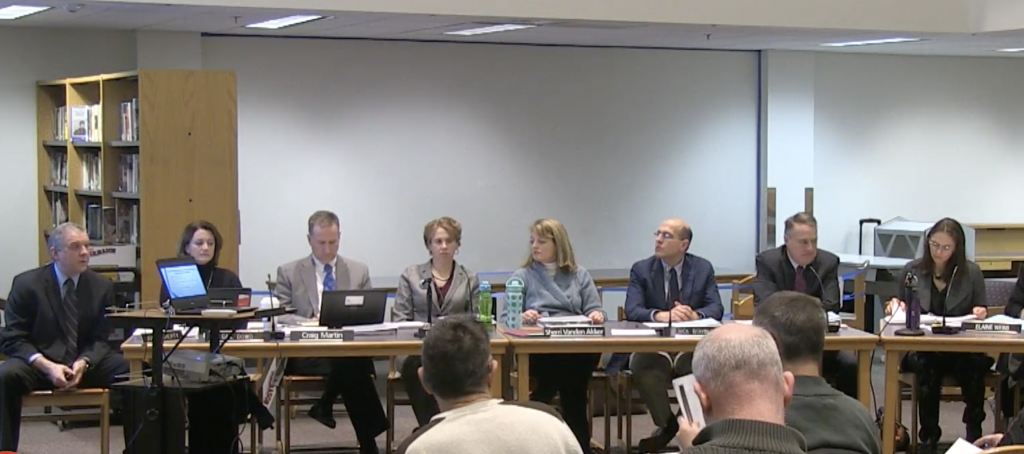 Reading, MA — The School Committee began its Fiscal Year 2019 budget process on Monday, January 8 with an overview of the superintendent’s budget, then did a closer review of three of the cost centers. Superintendent John Doherty began by clarifying that what was being presented was a balanced budget based on Finance Committee guidelines, not his recommended budget. Doherty commented that this budget “is not in the best interest of students.” The superintendent plans on presenting his “restoration” budget, the budget that would be recommended if a Proposition 2 1/2 override were to pass at the April town election, on Thursday, January 11. The balanced budget as presented for FY19 is $42,723,025 or a 3.2% increase over FY18. A “level services” budget would have required an additional $843,551. The balanced budget reflects a reduction of $200,000 of state circuit breaker reimbursement as well as other reductions in revenue from special education and from athletics.
Reading, MA — The School Committee began its Fiscal Year 2019 budget process on Monday, January 8 with an overview of the superintendent’s budget, then did a closer review of three of the cost centers. Superintendent John Doherty began by clarifying that what was being presented was a balanced budget based on Finance Committee guidelines, not his recommended budget. Doherty commented that this budget “is not in the best interest of students.” The superintendent plans on presenting his “restoration” budget, the budget that would be recommended if a Proposition 2 1/2 override were to pass at the April town election, on Thursday, January 11. The balanced budget as presented for FY19 is $42,723,025 or a 3.2% increase over FY18. A “level services” budget would have required an additional $843,551. The balanced budget reflects a reduction of $200,000 of state circuit breaker reimbursement as well as other reductions in revenue from special education and from athletics.
The balanced budget adds a preschool teacher and three preschool paraeducators to help meet the needs of an additional classroom at the RISE preschool program. It adds one kindergarten teacher and two kindergarten paraeducators to meet the expected additional kindergarten enrollment next year. It also adds three special education paraeducators.
The superintendent proposed several cuts to help balance the budget. Included in these cuts are seven middle school teachers, four elementary teachers from grades three to five, and two regular education tutors. These cuts would force a change in the middle school model which “has been successful for over thirty years.” Doherty commented. There would be a reduction in the number of literacy blocks for sixth-grade students and the loss of foreign language for students in grades seven and eight. “Class sizes in grades three to five could be as high as 27.” Doherty continued. There would also be a reduction in the number of vacation cleanings at the high school, a reduction in the number of athletic games played at each level and in each sport, reducing transportation and other costs. The elementary chorus program and the Virtual High School would both be eliminated. The budget also does not include $150,000 for the third year of the new science curriculum integration and does not fully fund special education out-of-district placements. Director of Finance Gail Dowd commented that if more money were needed for out-of-district tuition, they might have to ask for it at the November Town Meeting.
The three smallest cost centers were looked at in greater depth. The first was the administration cost center which represents 2.4% of the total budget. The superintendent hopes to restore the position of school business assistant to the budget in FY 2019. This would be accomplished through restructuring a few other roles and has no impact on the departmental bottom line. There is also an increase in the funds needed for mandated physicals and a contractually obligated tax-sheltered annuity program.
The next cost center, district-wide programs, is 5.8% of the total budget and includes contractual increases only. The final cost center discussed was facilities which makes up 3.2% of the total budget. There is an increase in the RMHS cleaning services contract but also fewer vacation cleanings included. The capital expense budget was also reviewed, the major piece being over $500,000 for a new boiler at RMHS. The boiler was not part of the 2007 renovation of RMHS and is past its useful life according to Director of Facilities Joe Huggins. School Committee Chair Chuck Robinson questioned whether or not it was needed this year but Doherty reminded the committee that if the money were not spent on the boiler, it would be spent on another capital need – not returned to the general fund.
The School Committee adjourned at 9:30 PM and will continue with budget discussions on Wednesday, January 10 at 7:00 PM.
